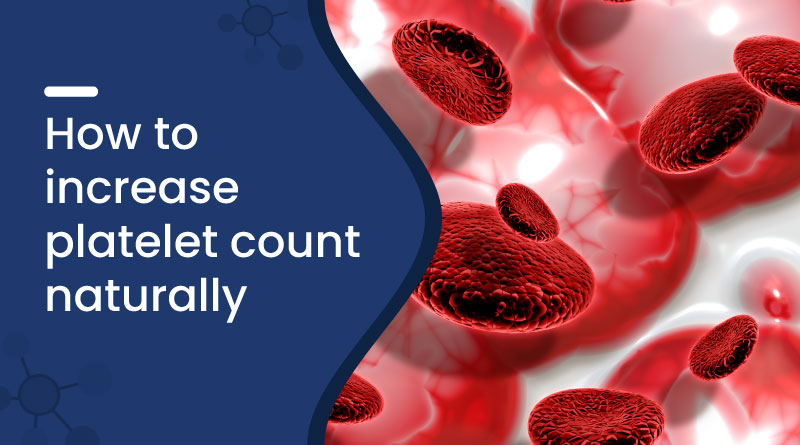How To Increase Platelet Count Naturally


Platelets are tiny cells, produced by the bone marrow, that are responsible for controlling bleeding by forming clots. When your platelet count drops, medically referred to as “thrombocytopenia,” it can lead to symptoms like easy bruising, tiredness, or slow healing. Many reasons can cause this, such as infections or a lack of nutrients. Thankfully, some natural ways, like eating the right foods and staying healthy, can help improve your platelet count. In this blog, we’ll explore safe, natural ways to help increase platelet count and promote overall blood health.
What Causes Low Platelet Count?
Before diving into remedies, it's important to understand what might be causing the drop in platelets. Finding and resolving the main cause is crucial. Alongside medical care, supportive dietary and lifestyle changes can make a noticeable difference. Common triggers include:
- Viral infections such as dengue, chikungunya, or hepatitis
- Autoimmune disorders like lupus
- Certain medications or chemotherapy
- Alcohol misuse
- Nutritional deficiencies (especially B12, folate, and iron)
Foods That May Help Increase Platelet Count
- Leafy Greens for Folate: Folate (Vitamin B9) plays a crucial role in cell formation, including the production of platelets. Spinach, kale, broccoli, and asparagus are rich in folate and should be included in your meals regularly.
- Papaya and Papaya Leaf Extract: Traditionally used in dengue fever management, papaya, especially the leaf juice, has shown promise in boosting platelet production. Many people include papaya in their recovery diet for platelet support.
- Pomegranate and Beetroot: These vibrant fruits are packed with antioxidants, vitamins, and minerals that help improve blood quality and boost platelet function.
- Citrus Fruits for Vitamin C: Vitamin C enhances iron absorption and strengthens immunity, both important for maintaining healthy platelet levels. Include oranges, lemons, amla (Indian gooseberry), and other citrus fruits in your daily diet.
- Pumpkin and Carrots for Vitamin A: Vitamin A aids in the production of platelets and supports bone marrow health. Include pumpkin, carrots, and sweet potatoes in your diet for a natural increase.
Supplements and Herbal Support
While food is the best source of nutrients, some herbal and natural remedies are popularly used to support platelet production. These include:
- Giloy (Tinospora cordifolia): A herb known to support immunity and reduce inflammation.
- Wheatgrass Juice: It contains chlorophyll, which is thought to support blood renewal.
- Amla (Indian Gooseberry): High in vitamin C, supporting immune and blood health.
Before taking any supplements, especially if you have health issues or are on medication, always check with a healthcare professional.
Ways to increase platelet count naturally
| Product | Key Features |
|---|---|
| NatureXprt Giloy Papita Ras | Helpful in treating chronic fever, typhoid, malaria, and dengue. Increases platelet count. |
| Zeelab Papaya Capsule | Helps in boosting platelet count when suffering from dengue and malaria. |
Nutrients That Play a Key Role
- Vitamin B12: A deficiency in B12 can lead to a drop in red blood cells and platelets. Eggs, milk, cheese, and fortified cereals are rich dietary sources.
- Iron: Iron deficiency can impact blood health. Include foods that contain high iron levels, like spinach, lentils, beans, and dates. Combining these with vitamin C can enhance absorption.
- Omega-3 Fatty Acids: Found in flaxseeds, walnuts, and chia seeds, omega-3s help reduce inflammation, support immunity, and may aid in overall blood cell production.
Lifestyle Tips to Support Platelet Health
- Stay Hydrated: Adequate water intake supports blood volume and circulation, helping platelets move efficiently through the body.
- Avoid Alcohol and Smoking: Both alcohol and tobacco can suppress bone marrow function, which is essential for platelet production.
- Get Enough Sleep: Poor sleep can weaken immunity and slow down the body’s healing processes. Aim for 7–9 hours of quality sleep every night.
- Practice Gentle Exercise: Moderate activity like walking or yoga can boost circulation and support overall wellness, but avoid heavy exercise if your platelet count is significantly low.
When to See a Doctor?
If you notice persistent signs like unusual bruising, bleeding gums, blood in urine/stool, or excessive fatigue, seek medical attention immediately. A low platelet count may indicate a more serious health issue requiring targeted treatment.
Conclusion
There are multiple ways in which you can naturally support your body’s ability to maintain a healthy platelet count: through a balanced diet, proper hydration, and a healthy lifestyle. You can go for natural remedies for the treatment of a specific condition, but it should never be replaced with medical care, especially in severe or chronic cases. Listening to your body, eating well, and consulting doctors can help maintain a healthy platelet level in your blood.
Frequently Asked Questions (FAQs)
Q. What can cause a decrease in platelet count?
A. Several reasons can cause a decrease in platelet count, like viral infections (dengue, chikungunya), nutritional deficiencies (B12, folate, iron), and certain medications.
Q. What do I eat to boost my platelet count in the blood?
A. To increase platelet count, you should eat more green vegetables (vitamin B9), and foods rich in Vitamin A and C.
Q. Is Papaya helpful in increasing platelet count?
A. Yes, Papaya leaf extract has traditionally been used to treat dengue fever, and it also boosts platelet production.
Q. Is having a low platelet count risky?
A. The risks of a low platelet count depend on how low it is and what’s causing it. Lower counts usually mean higher chances of complications.
Recent Blogs
Disclaimer : Zeelab Pharmacy provides health information for knowledge only. Do not self-medicate. Always consult a qualified doctor before starting, stopping, or changing any medicine or treatment.
















 Added!
Added!